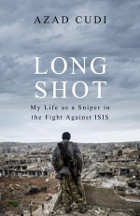Long shot : my life as a sniper in the fight against ISIS by Azad Cudi

Weidenfeld and Nicholson, 2019. ISBN: 9781474609784.
(Age: Adult) As a Kurd living in Iran, Azad Cudi was acutely aware
of being considered a second class citizen. Conscripted into the
Iranian army, life became intolerable when he realised that Kurdish
soldiers were being deliberately deployed against fellow Kurds.
Sickened by the oppressive system and officers who manipulated Kurds
to fight against their fellow countrymen and women, Cudi deserted
from the army. A long and difficult journey followed and ultimately
he was granted asylum in the United Kingdom where he gradually
established himself. Sadly however he missed his family desperately
and was fully aware that any communication with them would be
monitored by the regime.
Eventually Cudi secured a position as a journalist in Stockholm
covering Kurdish affairs. When the Syrian war developed in 2011, he
felt compelled to join his Kurdish brothers and sisters in resisting
ISIS which was intent on complete genocide.
Having skills developed during his Iranian military service, Cudi
offered himself to the Kurdish resistance fighters who had almost no
armaments or supplies. Selected for training as a sniper, he devoted
himself completely to repelling ISIS jihadists from various places
in the Kurdish region of Rojava, between Iraq, Syrian and Turkey.
Cudi's principal service took place in the Northern city of Kobani
where he protected his comrades as a sharp shooter, covering their
advances and endlessly scanning territory for ISIS infiltrators.
It is hard to image the conditions endured by the very few defenders
who courageously occupied destroyed buildings and fought house to
house against vastly superior numbers of extremely well-armed and
supplied jihadists.
The behaviour of the ISIS militants was unnecessarily brutal. Not
satisfied with taking territory, the infiltrators were proud of
torturing their captives in the most barbaric, degrading and awful
manner possible.
This is a grim book. The content is necessarily confronting in order
to convey the desperate circumstances these Kurdish men and women
endured and it speaks volumes that they were all volunteers,
willingly risking their lives to resist maniacally bloodthirsty
invaders.
Being unable to wash for months, suffering malnutrition from
inadequate food and hiding in destroyed buildings would prompt the
most hardened soldiers to retreat, yet these dedicated volunteers
stayed. Their desperate resistance and sacrifice of many lives
eventually prevailed and the survivors witnessed the Jihadists
abandon the siege and flee for their lives.
There can be no avoiding the fact that Cudi's role as a sniper was
to shoot human beings and he was extremely effective in that
capacity, killing hundreds. In no way was he safe however. Every day
and night he was targeted by opposition snipers and artillery. The
relentless daily fight for survival had grave impacts on his
physical and mental health, to the point where he had to be
evacuated from the front lines as a broken man.
What is clear from Cudi's account however, is that he seeks to tell
a story beyond his own. He guides the reader to appreciate the
amazing Kurdish community which had developed a new way of life,
celebrating gender equality and observing higher principles of care
and respect for humanity. Cudi gives high praise to the female
soldiers, many of them commanders who capably led their limited
forces to drive the invaders out of their homeland.
For those who have returned to the region, there is hope that homes
and community can be rebuilt.
Rob Welsh